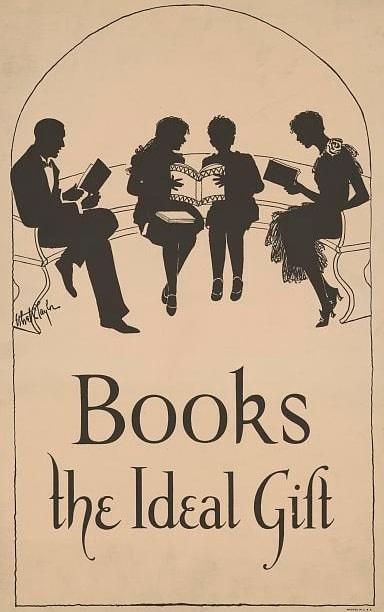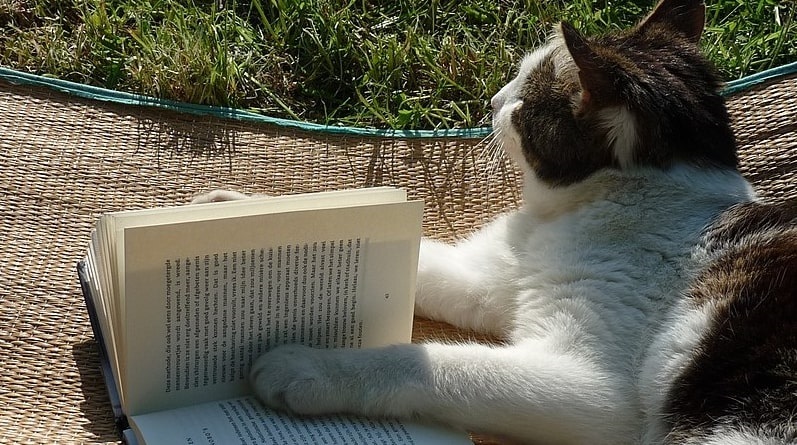Introduction: In this article – in honor of today being National Book Lovers Day – Gena Philibert-Ortega shares some of the lessons she’s learned about genealogy from her two book clubs. Gena is a genealogist and author of the book “From the Family Kitchen.”
It’s no surprise to anybody who knows me that I LOVE books. Bookcases or stacks of books are in every room of my house and I host two book clubs (one online and the other at a nearby coffee shop). Since National Book Lovers Day is today, I thought it would be a good time to share some of what I’ve learned about genealogy from leading my non-genealogy book clubs.
Set a Goal
Continuing education is vital to a genealogist. It helps you do better research when you’re committed to learning about genealogy methodology, good research techniques, new sources and places to research. One way to keep learning about genealogy and related subjects like DNA and even newspaper research is by setting a reading goal. It wasn’t until I set a reading goal for 2019 that I began to pay more attention to spending “down-time” (before bed, on trips, while waiting at appointments) reading or listening to audio books. Membership in a book club helps you to keep up on your reading since you know that you need to read the month’s book (or most of it) by the time the group meets. I also find it useful to keep a list of books I want to read and then consult that list as I finish each book on that list. Of course, I don’t always stick to the list but it’s a good reference.
What are some things you may want to read? Consider not only genealogy books but history for the place or time period you’re researching, historical fiction, DNA, geography, and other related topics. May I also suggest that instead of passively reading, if you own the book, highlight the paragraphs you think are important to remember, take notes in the margins, and write down questions you have next to complex sections. We learn more from reading when we study the text, paragraph by paragraph. I know it also helps me pay better attention to what I’m reading.

Be Curious
One of the comments I always love to hear from book club members is that they would never have read a selection if it had not been chosen for the book club. I think there’s a real benefit for going outside our comfort zone and reading books that are outside our usual interests. We can learn something new or come about solutions to problems in a new way. My coffee shop book club recently read Killers of the Flower Moon: The Osage Murders and the Birth of the FBI by David Gann, which tells the story of the Osage tribe and a murder plot that destroyed a family.
The author used government records, oral interviews, and other historical records to uncover this 1920s story. I love introducing genealogists to this book because the author used National Archives records, and the best part of sharing this book is that many people have never heard of the Osage murders. The response from most of the book club members was: “Why is this the first time I’ve heard of this?” It was especially poignant for one new member whose ancestors include the Osage. It provided her the opportunity to learn more, and has encouraged her to begin some family history research. Imagine accidentally learning more about your family history by attending a coffee shop book club!
The beauty of conducting genealogy in the internet age is it allows us to feed our curiosity. We can see an unfamiliar occupation in a census record and then use Google to learn more about it. We can search historical newspapers to learn more about Ellis Island during the time our ancestor arrived. Take a second look at those records you’ve collected. Be curious, ask questions, and learn more about your ancestor’s day-to-day life.

Network
Book Club night allows me to connect with friends that I may not have an opportunity to otherwise, due to time restrictions or location (a few of my virtual book club members live outside of the United States). What I love about this diverse group is that I’m constantly learning from those who attend, from their experience, background, questions, or the comments they provide about what we read.
In a recent meeting we discussed the book The Immortal Life of Henrietta Lacks by Rebecca Skloot, which allowed us to learn more about HeLa cells and medical ethics from two members who have biology and medical backgrounds. Some of this ethics discussion explored genealogy and DNA. The family history information and research about Henrietta Lacks was of special interest to this group of mostly genealogists. Similarly, a historical fictional account of Typhoid Mary (Fever, by Beth Keane), led my virtual group to explore medical ailments our ancestors suffered including typhoid and influenza.
Genealogy networking can be done through online and in-person communities such as genealogy society meetings, conferences, and Facebook groups. Although it’s easy to believe that genealogy is a solitary pursuit, it’s really a collaborative effort. A network of other family historians, related or not, can help you answer questions, learn about new resources, and uncover family information. Consider who your genealogy network is and in what ways you can add to it.
Start Reading!
Make it a goal to finish a book this month and learn something new for your family history research. If you decide to take a chance on a local book club, remember: even though they aren’t reading “genealogy” books, chances are they are reading books that will give you new ideas for your research.
Happy Reading!

